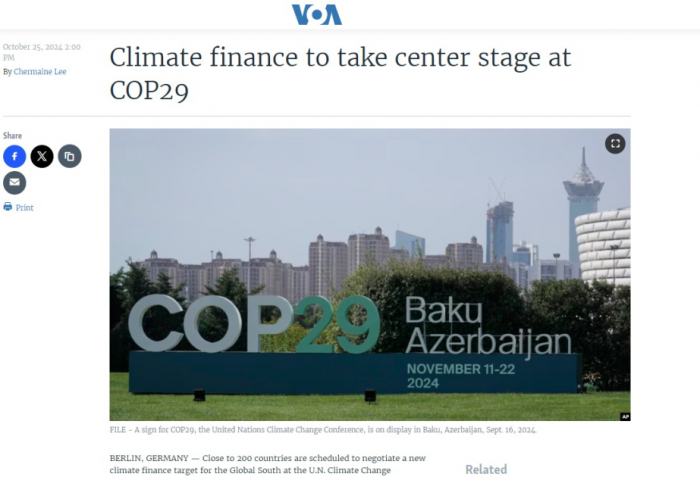The popular US broadcaster Voice of America’s website published an article by Chermaine Lee headlined “Climate finance to take center stage at COP29”.
“Close to 200 countries are scheduled to negotiate a new climate finance target for the Global South at the U.N. Climate Change Conference, or COP29, in Baku, Azerbaijan, in November.
Dubbed the “Finance COP,” next month’s conference is expected to see focused discussions on a New Collective Quantified Goal on Climate Finance, or NCQG. It defines a new target for monetary support from historic emitters – mostly countries in the Global North – to address climate needs in poorer countries,” the article said.
“In 2009, countries including the United States and the European Union agreed to contribute $100 billion collectively each year by 2020, but an OECD report showed that they struggled to meet that goal over the years. Worse still, much of the climate finance came in the form of loans, which critics say have piled more pressure on developing countries already drowning in debt.
The new negotiations come after a spate of extreme weather conditions intensified by human-caused climate change. July, for instance, witnessed the three hottest days ever recorded. Scientists said in an article on BioScience that as fossil fuel emissions reached an all-time high, the Earth is on track for 2.7 degrees Celsius warming by 2100, far above the 1.5 degrees Celsius target established in the 2015 Paris Agreement,” the author mentioned.
“Conference host Azerbaijan in July launched the Climate Finance Action Fund with an initial goal of raising $1 billion from fossil-fuel producing countries and companies.
Nations are likely to reach a compromise at the lower end of a NCQG goal, according to Irene Monasterolo, professor of climate finance at the Utrecht University.
“These results of the negotiations may not be able to address the current need for climate finance in low-income countries, which are massively affected already now by climate risk,” Monasterolo told VOA. “The focus so far has been mostly on mitigation [reducing emissions] projects and measures, while adaptation investments are lagging behind,” the article noted.
“At COP28 in Dubai last year, countries agreed to set up a voluntary fund for historic emitters to pay for the damage caused by climate disasters in vulnerable developing countries. Western countries also called for large emitters like China to contribute. Negotiators are expected to continue the discussion at COP29.
For now, it remains unclear whether the loss and damage fund will be included in the new NCQG, according to Karoliina Hurri, researcher at the Center on Climate Politics and Security at the Finnish Institute of International Affairs,” the author said.
“COP29 will also mark the first cooperation talks between the new envoys from the United States and China — John Podesta and Liu Zhenmin. They had a working group meeting in Beijing in early September, in which they agreed to host a summit on methane and non-carbon greenhouse gases during the climate conference,” Hurri emphasized.
More about:











-1747837442.jpg&h=190&w=280&zc=1&q=100)




































